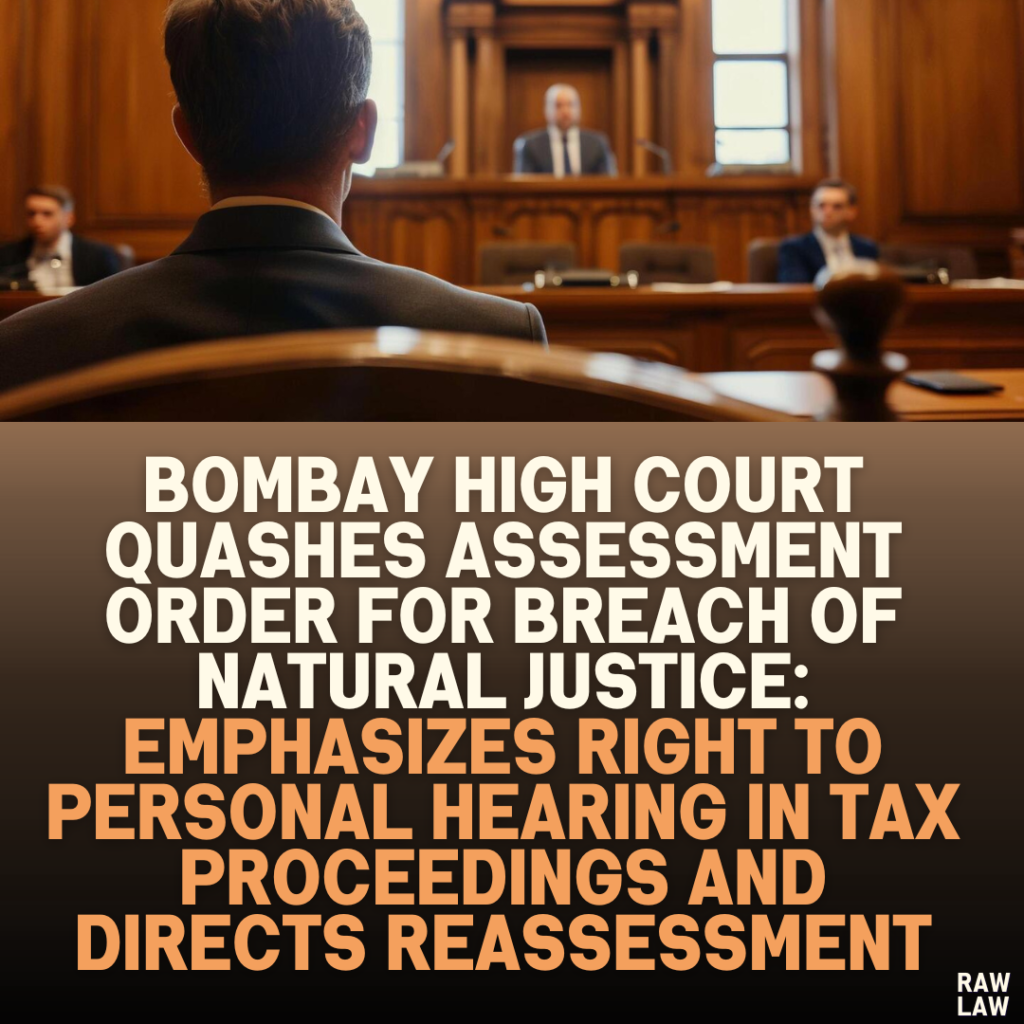Court’s Decision
The Bombay High Court quashed the assessment order dated 26 March 2024, along with all consequential notices, on the grounds of a breach of natural justice. The Court ordered the matter to be remanded back to the Assessing Officer (AO) with instructions to dispose of the show cause notice issued to the petitioner after granting a personal hearing. The reassessment proceedings must be completed within three months of the order’s publication on the Court’s website.
Facts
- The petitioner challenged the assessment order issued under Section 148A(d) of the Income Tax Act, 1961.
- The petitioner had explicitly requested a personal hearing in response to a show cause notice.
- The request was denied by the Assessing Officer (AO) on the grounds that the petitioner had nothing further to add to their written submissions.
- The denial of the hearing was justified by the respondents based on procedural constraints, particularly the transfer of the case from a Faceless Assessing Officer (FAO) to a Jurisdictional Assessing Officer (JAO).
Issues
- Was the denial of a personal hearing to the petitioner a violation of the principles of natural justice?
- Could the assessment order be sustained despite the procedural breach?
Petitioner’s Arguments
- Personal Hearing Requested: The petitioner argued that they had explicitly sought a personal hearing in response to the show cause notice, which was unlawfully denied.
- Circular Provisions Ignored: They highlighted Circular No. F.No.225/97/2021/ITA-II (dated 6 September 2021), which requires that personal hearings generally be allowed, preferably through video conferencing.
- Breach of Natural Justice: The denial of a hearing violated their statutory rights and deprived them of the opportunity to effectively present their case.
Respondent’s Arguments
- Jurisdictional Transfer Justification: The respondents contended that personal hearings via video conferencing were not feasible after the case was transferred to the JAO on 20 February 2024.
- Physical Hearing Option: The petitioner was informed about the change in jurisdiction and could have attended a physical hearing at the JAO’s office but did not do so.
- Sufficient Submissions: The AO reasoned that there was no necessity for a personal hearing since the petitioner had already submitted detailed replies to the show cause notice.
Analysis of the Law
The Court emphasized that personal hearings are a critical aspect of natural justice, especially when explicitly provided for by law. The denial of such hearings undermines the taxpayer’s ability to argue their case effectively. It relied on:
- John v. Rees [(1970) 1 Ch D 345]: Highlighting that even seemingly straightforward cases require adherence to natural justice principles to prevent arbitrary decisions and resentment.
- Circular No. F.No.225/97/2021/ITA-II: Reinforcing the importance of granting personal hearings, preferably through video conferencing.
Precedent Analysis
The Court referred to:
- Megarry J.’s Observations in John v. Rees: To underline that decisions made without affording a fair hearing are likely to be flawed and cause dissatisfaction.
- Income Tax Circular: Establishing a clear protocol for providing personal hearings, which the respondents failed to follow.
Court’s Reasoning
The Court provided the following rationale:
- Statutory Right: A personal hearing is a statutory right that cannot be denied on subjective grounds such as “no further inputs are needed.”
- Flawed Justification: The procedural constraints cited by the respondents, including the jurisdictional transfer, were insufficient to override the petitioner’s rights.
- Principle of Fairness: Adhering to the principles of natural justice ensures the taxpayer has a chance to fully explain their position and address any concerns raised by the AO.
Conclusion
- Assessment Order Quashed: The Court set aside the assessment order dated 26 March 2024 due to the failure to grant a personal hearing.
- Remand for Reassessment: The matter was remanded back to the AO for reassessment, with directions to grant the petitioner a personal hearing.
- Timelines Set: The reassessment must be concluded within three months of the order’s publication on the Court’s website.
Implications
- Reaffirmation of Natural Justice: This judgment reiterates the importance of procedural fairness in tax assessments, emphasizing that taxpayers must be granted personal hearings when required by law.
- Administrative Accountability: Tax authorities must ensure compliance with statutory provisions and departmental circulars to avoid procedural breaches.
- Guidance for Faceless Assessments: In cases involving faceless and jurisdictional assessments, the judgment provides clarity on the taxpayer’s rights and the AO’s obligations.




Pingback: Delhi High Court Highlights Judicial Discretion in Allowing Additional Written Statements Under Order VIII Rule 9 CPC: Addresses Material Subsequent Developments in Commercial Patent Disputes - Raw Law